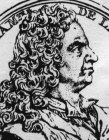

French composer. His younger brother Joseph (1662-1744) was also a musician; some of the latter's works have been wrongly attributed to André. In 1674 Campra entered the choir of the Church of St. Sauveur, where he studied music with Guillaume Poitevin. He took orders for the priesthood in 1678 and was made chaplain three years later. After posts as maitre in Arles (1681-83) and Toulouse (1683-94), he went to Paris, having received the prestigious post of Maître de Musiqueat Notre Dame. Around 1695 he may also have served as Maître de Musiqueat the Collège Louis-le-Grand. During the 1690s a number of patrons employed his theatrical and compositional skills, but because of the moral strictures governing the production of operas during this period, works were often published anonymously: the first editions of Campra's early success L'Europe galante(opera-ballet, 1697) appeared with no attribution. In 1700 Campra gave up his post at Notre Dame and assumed theatrical composition full-time. He secured a 12-year printing privilege, with which he published Iphigénie en Tauride(first perf. 1704), Hippodamie(1708), Les fêtes vénitiennes (1710), and Idomenée(1712). In 1718 he was pensioned by Louis XV From 1722 he served the Prince of Conti, Louis-Armand de Bourbon; finally he was appointed sous-maître,along with Bernier and Gervais, of the royal chapel, and from 1730 he was also inspector general of the Académie royale de musique. He suffered ill health during his last decade and died only three months after the death of his brother Joseph. In addition to operas he composed more than twenty cantatas, well over 100 motets and grands motets, songs and airs, and many other sacred vocal works.